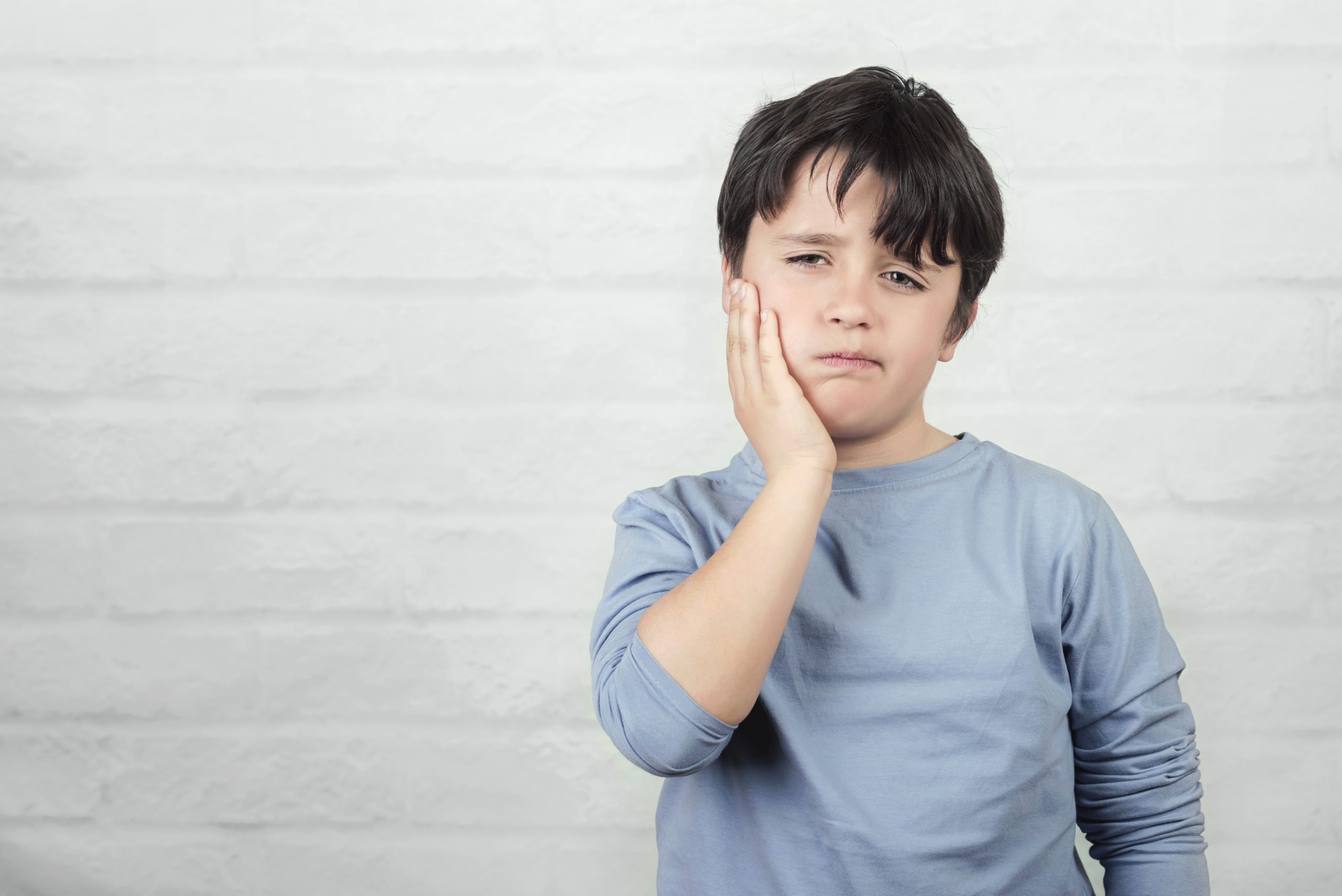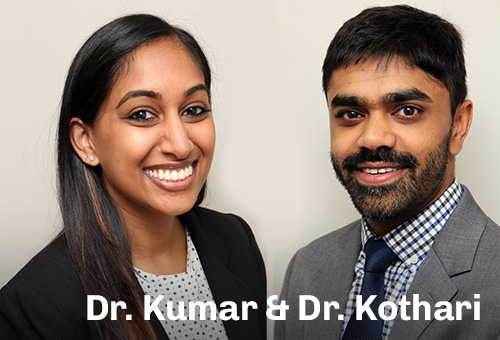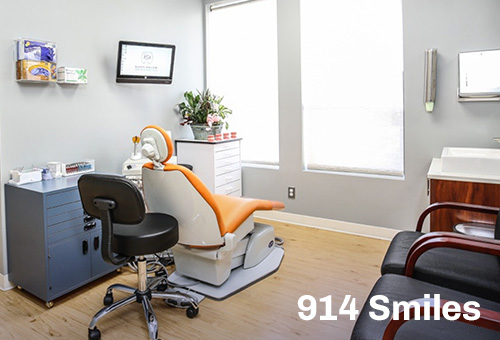
When your child has tooth pain, it’s distressing for your little one and, of course, for you too. After all, one of the toughest parts of being a parent is seeing your child in pain. You feel helpless and just want to take the discomfort away. As a Tarrytown pediatric dentist, Dr. Reshma Kumar totally understands, which is why we’re sharing some solutions for different causes of toothaches.
Ultimately, figuring out how to get rid of tooth pain in kids will depend on the underlying causes of toothaches and, in most cases, you will want to bring your child to the dentist sooner rather than later. However, that said, there are home remedies for a child’s tooth pain that may help keep your kiddo comfortable until their appointment.
In this post, we’ll cover:
Things to Look for if Your Child has a Toothache
If your child has a toothache, evaluate the situation to make sure it’s not a dental emergency. Older kids can likely describe the issue, whether it’s persistent throbbing tooth pain or tooth pain that comes and goes, but younger children aren’t always able to verbalize what they are feeling.
First, check to see if your child has a fever or any facial swelling. If they do, call the pediatric dentist right away as it can be a sign of infection. You’ll also want to ask if your child was injured and look for obvious signs of trauma like cuts on the lips or tongue and broken, missing or loose teeth.
If you suspect your child could have a dislocated or broken jaw or a concussion, seek medical attention right away. For a permanent tooth that has fallen out, fractured, or is loose, call the dentist immediately. It can often be repaired or reimplanted in the first hour or two following an injury.
If a toothache is not the result of trauma or infection, and the pain isn’t severe, you will want to make an appointment with your dentist. Once you’ve ruled out emergencies, look in your child’s mouth for things like food that has become stuck, red or swollen gums, tooth discoloration and signs of decay, which could all help you determine the culprit behind your child’s tooth pain.
What are the Causes of Toothaches in Kids?
The most common causes of toothaches in children include:
- Tooth Decay – A small cavity or early stage tooth decay in children might not hurt very much, if at all. However, if not treated, the cavity will get bigger and eventually reach the tooth’s nerve, which is one of the main causes of severe tooth pain. Tooth nerve pain is usually throbbing, persistent and painful enough to wake kids up from sleep. A large cavity can also lead to sharp pain that increases when lying down, so it’s not uncommon for a child to complain of tooth pain at night.
It’s important to note that infants can get a cavity as soon as their first tooth erupts. This is why you should never give a baby a bottle in their crib that contains anything aside from plain water. It can cause what’s referred to as baby bottle tooth decay.
What’s baby bottle tooth decay? Well, when infants are sleeping, their saliva production slows down. If you give them a bottle at night, sugars from the breast milk, formula, cow’s milk or juice will sit on their teeth for hours on end and won’t be washed away and neutralized by saliva like they are during the day.
As the bacteria in the mouth feed on these sugars, they release acids that eat away at the enamel, causing tooth decay.
- Issues With Fillings or Dental Crowns – If a child’s filling or pediatric dental crown becomes loose and isn’t repaired, food and bacteria will work their way under the restoration, leading to decay and inflammation in the tooth’s pulp, which can cause severe tooth pain in a child. If the filling falls out, then food can get stuck in the empty space, which may result in sensitivity and pain when chewing. Dr. Kumar can easily and quickly fix a loose filling or pediatric dental crown before problems occur, so schedule an appointment if you notice an issue with your child’s restoration.
- Losing Teeth – Loose tooth pain in a child doesn’t usually require treatment, as long as it’s because it’s ready to fall out naturally and not because of injury or decay. While losing baby teeth isn’t always painful, sometimes, as the permanent tooth beneath it gets ready to come in, it pushes against the gums, which can cause discomfort.
- Trauma – While kids of any age can experience an injury to their mouth resulting in damage to the teeth or the jaw, trauma is an especially common cause of tooth pain in a toddler. As little ones learn to walk, they’re not always steady on their feet and fall pretty frequently. For older children, oral injuries most often happen during sports. That’s why kids and teens should always wear a mouthguard when playing sports or doing any physical activity where a fall or blow to the face is a possibility.
- A Dental Abscess – When a tooth becomes infected and isn’t treated, an abscess, or small pimple filled with pus, can occur on the gums. When a child has a gum abscess or infection in their tooth, they may have a fever too. The pus creates pressure that causes severe, throbbing pain in the tooth and gums (either persistent pain or pain that comes and goes). Your child may also have bad breath, a bad taste in their mouth, shiny, swollen, red gums and facial swelling.
A dental abscess is serious and will not resolve on its own. If the tooth is not treated, the infection can spread to the surrounding teeth and bones and even other areas of the body, leading to health issues. If you think your child has a dental abscess, call your dentist immediately.
- Gum Disease – Gum disease in children can happen. While the advanced form of gum disease, known as periodontitis, is rare in children, kids do develop its milder cousin, gingivitis. This sometimes causes the gums to hurt, which kids may perceive as tooth pain. Signs of gingivitis include swollen, red gums, receding gums, bleeding when brushing and flossing, and bad breath.
- Teeth Grinding or Clenching – Teeth grinding or clenching, technically called bruxism, is more common in kids than you might think. Some kids grind or clench their teeth throughout the day and during times of stress, others do it in their sleep. It puts undue pressure on the teeth, jaw and jaw joints, which can cause discomfort. It also leads to excessive wear of the enamel. As the enamel breaks down, it exposes the underlying dentin, making teeth more sensitive.
- TMJ Dysfunction – Temporomandibular joint (TMJ) dysfunction, can lead to jaw and tooth pain. Determining whether discomfort is from something like a cavity or TMJ problems is fairly straightforward, because, similar to grinding and clenching, TMJ dysfunction will result in pain in multiple teeth as opposed to one tooth.
- Cracked or Chipped Teeth – Cracks or chips in the teeth typically cause tooth pain and sensitivity when eating or drinking something hot or cold. Damage can happen because of an injury and hairline cracks also crop up because of teeth grinding, a misaligned bite or chewing on hard objects like pens, pencils or ice.
- Sinus Issues – Kids have sinuses that sit right above their top teeth. When the sinuses are congested or inflamed because of allergies, a cold or a sinus infection, the pressure can cause aching in the upper teeth. When this is behind tooth pain in kids, they’ll usually also have a runny nose, nasal congestion and pain in several teeth. Once the infection is treated or heals, tooth pain should resolve.
- Orthodontic Treatment – While kids should never experience severe pain from orthodontic treatment, braces, Invisalign Teen and different orthodontic appliances can cause the teeth to ache and feel sensitive at the start of treatment. Kids’ teeth and jaw may also be a bit tender after adjustments or switching to a new set of clear aligners.
- Diet – A child’s toothache could be from something they ate, such as really hard, sugary or acidic foods or beverages. If your child’s prone to sensitive teeth or some of their enamel is worn, these types of food may be uncomfortable to eat.
- Aggressive Brushing – Yes, thoroughly brushing the teeth is a good thing. However, aggressive brushing or using a toothbrush that’s too hard and stiff can cause tooth and gum pain. Brushing with too much force wears down the enamel, increasing tooth sensitivity. It may bruise or cut the gums as well.
How to Achieve Tooth Pain Relief For Kids at Home
Wondering how to help a child with tooth pain? There are several home remedies for tooth pain that are safe and could be effective. However, keep in mind, these remedies won’t treat the underlying causes of toothaches. Your child will still need to visit a dentist for issues such as decay, infection, cracks or chips, loose restorations and gum disease. But, in the meantime, try the following suggestions for short-term relief:
- Gentle Flossing and Brushing – Try gently flossing and brushing around your child’s sore tooth. If the pain is the result of pressure from food being trapped, this can dislodge the food and eliminate the pain. For other causes of toothaches, keeping the area clean will help ward off infection or worsening discomfort.
- Saltwater Rinse – Mix a half of a teaspoon of salt in a glass of warm water. Have your child swish the saltwater rinse around in their mouth, hold it over the affected area and then spit it out. You can repeat this tooth pain remedy as often as necessary.
- Over-the-Counter Pain Relievers – As for how to stop tooth pain fast, an over-the-counter pain reliever can help. Give your child whatever they’d normally take for a headache. Even in cases of severe tooth pain, research suggests that nonsteroidal, OTC pain relievers, both with and without acetaminophen, offer the best possible balance between benefits and risks for acute tooth pain relief when compared to prescription options. Just be sure your child takes the pain reliever by mouth. Never rub aspirin on the tooth or gums. This old folk remedy is not just ineffective, it’s dangerous and can damage the soft tissues of the mouth.
- Cold Compresses – Have your kiddo hold a cold compress or ice pack on their cheek or jaw in the affected area on and off for a few minutes at a time. This will help with pain and swelling.
- Wax – If kids are old enough to be trusted not to swallow the wax, you can use softened orthodontic relief wax in the case of a loose or broken filling or crown. If the filling or crown came off completely, wax will protect the exposed area of the tooth, alleviating sensitivity and pain. For a loose filling or crown, it can help to temporarily hold the restoration in place.
Home Remedies for Tooth Pain That are NOT Safe for Kids
Two popular home remedies for tooth pain include topical anesthetics and clove oil. Over-the-counter anesthetics that are formulated to get rid of tooth pain fast often contain benzocaine, which numbs the area. Benzocaine causes a rare but serious health condition in children, especially those under the age of two. So, don’t use products with benzocaine on young children and for older kids, it’s a good idea to talk with your pediatric dentist or pediatrician first.
Clove oil was found to be just as effective as benzocaine as a topical anesthetic in a 2006 study published in the Journal of Dentistry, making it a good option for tooth pain relief for adults. Unfortunately, clove oil is not safe for kids because it can potentially cause seizures and fluid imbalances.
Schedule an Appointment With Our Tarrytown, NY Pediatric Dentist
We hope these home remedies for a toothache help to reduce your child’s discomfort. Though again, any time kids have a toothache, unless caused by something like a sinus infection or orthodontic treatment, it’s important to have the tooth evaluated by your pediatric dentist.
Even if tooth pain goes away, it doesn’t mean the underlying issue has resolved itself and the tooth may still need to be treated to prevent infection or other problems. The earlier issues like tooth decay in children are addressed, the easier and less invasive treatment will be.
So, if your little one is in pain, let’s work together to unravel the causes of their toothaches and get their oral health back on track! Schedule a visit with our Tarrytown dentist for kids Dr. Kumar today. Dr. Kumar will help determine the reason for the discomfort and help your child feel better.



